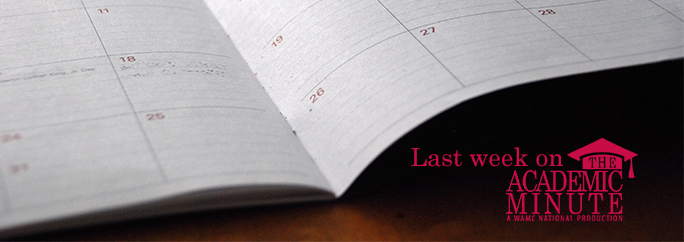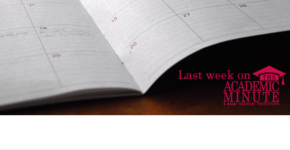
The Academic Minute from 11.02 – 11.06
Monday, November 2nd
Phil Chen – Beloit College
Political Representation
Philip Chen is assistant professor of Political Science at Beloit College.
Philip’s work has appeared in numerous journals in political science and psychology, including Political Behavior, American Politics Research, Personality and Individual Differences, and Political Research Quarterly. His work concerns the role of social identity in U.S. politics through the lens of political psychology, with a particular focus on how political communication alters the effects of race and gender on political behavior and public opinion.
Philip is a frequent guest on Wisconsin Public Radio and Minnesota Public Radio. Prior to entering academia, he worked for the Minnesota State Legislature. He teaches courses on U.S. politics, race and ethnicity, political psychology, and research methodology.
Tuesday, November 3rd
David Schultz – Hamline University
Baby Boomer Era of Politics Ending
David Schultz is a Hamline University Professor of Political Science who teaches across a wide range of American politics classes including public policy and administration, campaigns and elections, and government ethics. David is also a professor in the Hamline and University of Minnesota Schools of Law where he teaches election law. David is the author of 30 books and 100+ articles on various aspects of American politics, election law, and the media and politics, and he is regularly interviewed and quoted in the local, national, and international media on these subjects by agencies including the New York Times, The Wall Street Journal, The Washington Post, The Economist, and National Public Radio. His most recent books are Presidential Swing States: Why Only Ten Matter (2015), Election Law and Democratic Theory (2014), and American Politics in the Age of Ignorance: Why Lawmakers Choose Belief Over Research (2013). A three-time Fulbright scholar who has taught extensively in Europe, Professor Schultz is the 2013 Leslie A. Whittington national award winner for excellence in public affairs teaching.
Wednesday, November 4th
Paul Cook – Indiana University Kokomo
Digital Habits
Paul Cook is Associate Professor of English at Indiana University Kokomo, where he researches problematic information and its effects on how we learn, know, work, and play in the digital era. Dr. Cook recently co-hosted a series of webinars on digital literacy, pandemic pedagogy, and deliberative democracy through the American Association of State Colleges and Universities. He is also involved in the American Democracy Project’s Digital Polarization Initiative and is a founding member of IU Kokomo’s award-winning Mind over Chatter team, which designs innovative curriculum based on cognitive psychology and mindfulness techniques to help train students to be better consumers of digital media.
Thursday, November 5th
Lisa Martin-Hansen – California State University Long Beach
Transforming Spatial Thinking
Dr. Lisa Martin-Hansen (California State University, Long Beach) and her spatial thinking research team, Dr. Youngjin Song (CSULB), Dr. Susan Gomez Zwiep of BSCS, and Hye Sun You of Michigan State, have gathered five years of data regarding students’ spatial thinking abilities in the general education course titled Introduction to Scientific and Spatial Reasoning.
Friday, November 6th
Daniel Gifford – University of Louisville
Lessons From A Failed Whaling Museum
Daniel Gifford teaches courses in American history and museum studies at the University of Louisville. His career spans both academia and public history, including several years with the Smithsonian Institution. His scholarship focuses on American popular and visual culture, as well as museums in American culture. He received his PhD from George Mason University in 2011. His most recent book is The Last Voyage of the Whaling Bark Progress: New Bedford, Chicago and the Twilight of an Industry (McFarland Press, 2020). It retraces the voyage of the whaling bark Progress from New Bedford, Massachusetts to the Chicago World’s Fair, and explores questions of commemoration, historical memory, and what it means to transform a dying industry into a museum piece.
